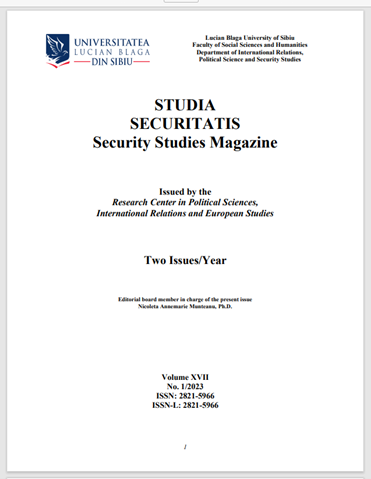NATIONAL IDENTITY IN THE ROMANIAN AND HUNGARIAN SECURITY STRATEGIES – STILL A SOCIETAL SECURITY PRIORITY?
NATIONAL IDENTITY IN THE ROMANIAN AND HUNGARIAN SECURITY STRATEGIES – STILL A SOCIETAL SECURITY PRIORITY?
Author(s): Angela-Karina AvădăneiSubject(s): Governance, Government/Political systems, International relations/trade, Security and defense, Military policy, Developing nations, Geopolitics, Politics and Identity, Peace and Conflict Studies, Asylum, Refugees, Migration as Policy-fields
Published by: Editura Universitatii LUCIAN BLAGA din Sibiu
Keywords: Societal security; national identity; functional; resilience; crisis management; migration; strategy;
Summary/Abstract: The “societal security” concept rooted in Copenhagen’s School works currently bears different approaches and uses. Two paradigms of understanding are specific to its employment – an “identity-based” one and a functional one. While the first see “identity” as a referent object - and societal threats are defined accordingly, the second refers to the ability of a society to function, being thus subject to various threats. The current paper examines how “societal security” is conceptualized in Romania’s National Defence Strategy and Hungary’s National Security Strategy (documents issued in 2020) aiming to identify as well potential sources of friction resulting from Hungary’s extensive use of the concept “Hungarian political nation” – which includes the Hungarian national minority in Romania. The research builds on the existing knowledge about the conceptualization of societal security in policy documents and academic literature of states in the Baltic Sea Region, where either one or the other meaning is predominant or substituted with associated concepts. The contents of the strategies were qualitatively analyzed through a hybrid coding approach (first deductive and then inductive), using a computer-assisted qualitative data analysis package (MAXQDA) to enhance the validity of the findings. The coding process was based on various definitions given to societal security and its associated concepts in Copenhagen’s School understanding, the “Nordic” perspective, and the academic literature of states in the Baltic Sea Region.
Journal: Studia Securitatis
- Issue Year: XVII/2023
- Issue No: 1
- Page Range: 47-56
- Page Count: 10
- Language: English
- Content File-PDF

